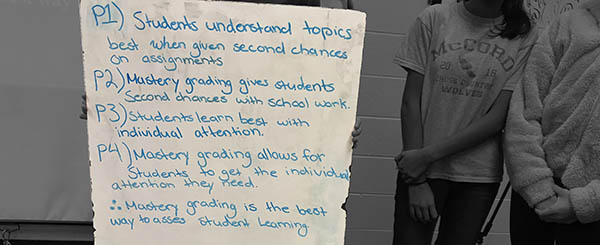Mastery Assessment

At Phoenix Middle School, we embrace an innovative approach called Mastery Assessment, focusing on students' deep understanding and proficiency in subject matter rather than traditional point-based grading systems. This method involves three stages: Introduction Assignments to present new concepts, Practice Assignments for skill refinement, and Mastery Assignments to demonstrate comprehensive understanding. Our goal is to cultivate intellectual discipline, global awareness, creative expression, wellness, and character in our students.
The benefits of Mastery Assessment are significant. By revisiting material until mastery is achieved, students gain a deeper understanding and better retention of content. This approach increases engagement and motivation by setting clear, achievable learning goals and reduces achievement gaps by emphasizing competency. Additionally, meaningful formative feedback helps students improve, and the focus on responsibility and autonomy prepares them for future academic challenges. Our Mastery Assessment Portal (M.A.P.) provides real-time insights into students' progress, fostering transparency and parental involvement.
We support student growth through various initiatives, including Learning Extensions—teacher-supervised sessions to enhance learning—and Discovery Days, which offer exploratory, real-world learning experiences for students who achieve mastery. By separating academic assessments from behavior assessments, we provide a clearer picture of student development, focusing on both academic proficiency and essential work habits. At Phoenix Middle School, we are committed to preparing students for long-term success and fostering a love for learning.
Read or Print our detailed 2024-25 Mastery Manual.
Further Resources
- "Formative Assessment and the Design of Instructional Systems" by D. Royce Sadler - A foundational paper that explores the role of formative assessment in instruction, including mastery assessment.
- "Mindset: The New Psychology of Success" by Carol S. Dweck - Though not strictly about mastery-based assessment, this book delves into the growth mindset, which is foundational to mastery learning models.
- "Fair Isn't Always Equal: Assessing & Grading in the Differentiated Classroom" by Rick Wormeli - This book offers a nuanced look at assessment, including mastery-based approaches, in a diverse classroom.
- "Handbook of Formative Assessment" edited by Heidi L. Andrade and Gregory J. Cizek - This comprehensive handbook includes a range of articles and research findings related to formative and mastery assessments.
- "The Case Against Grades" by Alfie Kohn - A web-based resource that makes the case for more qualitative, mastery-based forms of assessment instead of traditional grading.
- "A Repair Kit for Grading: 15 Fixes for Broken Grades" by Ken O'Connor - This resource provides practical advice on how to fix common grading problems, including insights into mastery-based assessment. Here is a quick summary.
- "Assessment, Grading, and Feedback In a Learning Culture" by Lorrie A. Shepard - A seminal article that talks about the difference between traditional grading and mastery assessment.
- "Transforming Classroom Grading" by Robert J. Marzano - The book outlines a variety of grading models and the research that supports them, including mastery-based grading systems.
- The Mastery Transcript Consortium (MTC) is not a reading per se, but an organization that aims to change the way students are assessed and credentialed in a mastery-based system. Their website offers articles, research, and case studies.
- "Rethinking Grading: Meaningful Assessment for Standards-Based Learning" by Cathy Vatterott - Vatterott's work is a comprehensive guide that includes discussions about replacing traditional grading with more meaningful and mastery-based assessment systems.
Video Resources
- Sal Khan | Let's teach for mastery -- not test scores
- Sir Ken Robinson and assessment | HundrED
- Rick Wormeli: Part One - Redos, Retakes, and Do-Overs, | Part Two - Redos, Retakes, and Do-Overs,
- Thomas Guskey | Corwin Leaders Coaching Leaders Podcast - Mastery Learning
- Ken O'Connor | Excerpt from "A Repair Kit for Grading: 15 fixes for broken grades" -
